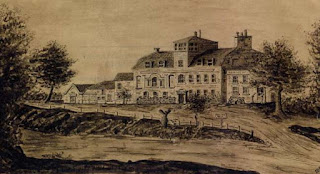
He was born in the Royal Military Academy - and the previous chapter has described how his parents came to live there following his father's appointment as Professor of Fortification and Artillery. The old Royal Military Academy building on the Arsenal site still exists although it has been in other use for 210 years. Clearly in 1779 it sat in rather different surroundings.
The RMA was built on the site of what had been Tower Place built before 1545 and with - obviously - a tower, and more of that to come. Gradually, throughout the 17th century the manufacture of armaments expanded around the area and it came into the ownership of the Board of Ordinance. By the early 18th century it was becoming the major centre for ordinance in the country. Today the RMA building is surrounded by other distinguished buildings from this era - The Royal Brass Foundry and the Great Pile, both of 1717, are just two of them.
Tower Place itself was replaced in 1718, although the tower remained. It was to contain a 'great room' to be an academy to train young officers for the new 'scientific corps' - the future Artillery and Engineers. In the 1740s two houses were built at the back for the First and Second Masters - and the Landmanns were accommodated in one of these. In 1764 it was reorganised and the cadets were henceforth taught, writing, arithmetic, algebra, Latin, French, mathematics, fortification, attack, defence, gunnery, mining, laboratory work, fencing, dancing. The two masters were Professors of Fortification and Artillery, and of Mathematics and there were other staff for specialist areas. Appointments were to include some of the most distinguished scientists of the day - and this was the foremost educational establishment for technical subjects in the country. It is an educational heritage of which, I think, Woolwich should be proud.
 |
| Tower Place and the RMA building |
At the time of Isaac Landmann's appointment Viscount Townshend was Master General of the Ordinance and as, George, says a frequent visitor to the Landmann household. In fact, as we shall see, the first chapter of George's autobiography is very much taken up with his father's interactions with Townshend and other such important personages. The post of Master General has been abolished only three ago, in 2013. It had been created under Henry VIII and was responsible for what we would think of as all the military hardware. Many of its holders had places in the Cabinet of their day and were generally extremely important people. George Townshend was a career soldier and administrator who worked closely with Lord North - but his tenure as MasMaster of Ordinance was not continuous.
Townshend was young George Landmann's godfather. His other godfather was Sir Thomas Page, the man who had gone to France to recruit Isaac Landmann to Woolwich, for George III. His godmother was Lady Townshend - Townshend second wife, Anne Montgomery. He also says that his oldest friend was Thomas Hislop ' afterwards General .... who first took me from the nurse into his arms'. He omits to say that Hislop, was a lad of sixteen at the time - and that his promotion to General was some thirty years in the future.
George III was a frequent visitor to Woolwich in this period and special displays would be put on by the cadets and members of the artillery. Isaac Landmann is recorded as having prepared for him paper models of cannon and carriages to demonstrate their workings. Cannon were demonstrated when proved and on these occasions the Board of Ordinance would come to Woolwich and eat a large dinner in one of the rooms of the RMA. For this a cook plus all his ingredients would be sent down from London by boat. Isaac Landmann would be asked to attend these occasions, and while waiting for dinner Lord Townshend would entertain the company with stories of the siege of Quebec, the heroism of General Woolfe, and similar.
Townshend also entertained at the Chocolate House on Blackheath, a famous establishment near the top of Crooms Hill in Greenwich, in the area now known as Westgrove Lane. Landmann also records a dinner given by Townshend on the occasion of his reappointment as Master of Ordinance. This was at the Bull on Shooters Hill and consisted of hundred and fifty one men from the Ordinance and from the Arsenal. The Bull was then a relatively new pub having been built in 1749 but was rebuilt in 1881 so that the pub we see now is different, and very much smaller.
 |
| The Bull Shooters Hill clearly very different from the modern pub |
George was sent to school at the age of six and this again is somewhat of a mystery. He says he was sent to a school run by a M. Dufort, a Frenchman. This school has so far resisted tracing but Landmann says it was later run by Dr. Watson. This is undoubtedly the same Dr.Watson who was to later tutor Princess Caroline and who lived near the Bull on Shooters Hill. Watson specialised in tutoring boys destined for the Royal Military Academy - but Shooters Hill seems a long way to send a small child daily from the Woolwich riverside
At school George Landmann first encountered Willam Congreve, who became a life long friend. This is the rocket inventor whose father was then Comptroller of the Royal Laboratories at the Arsenal. Congreve was however seven years older than Landmann, so they were unlikely to have actually been at school together. Landmann had a lot to say about Congreve - but perhaps this can wait for the future occasions when they worked closely together.
A lot more to come
Sources
Benson Earl Hill. Home Service
George Landmann. Adventures and Recollections a l.
English Heritage. Survey of Woolwich.
Wikipedia, as relevant
No comments:
Post a Comment